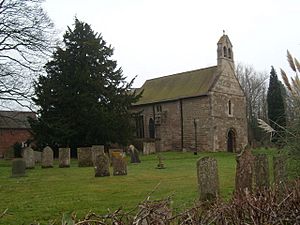St Giles' Church, Edingley facts for kids
Quick facts for kids St Giles' Church, Edingley |
|
|---|---|

St Giles' Church, Edingley
|
|
| 53°5′44.26″N 1°0′27.97″W / 53.0956278°N 1.0077694°W | |
| OS grid reference | SK 66508 55862 |
| Location | Edingley |
| Country | England |
| Denomination | Church of England |
| History | |
| Dedication | St Giles |
| Architecture | |
| Heritage designation | Grade II* listed |
| Administration | |
| Parish | Edingley |
| Deanery | Newark and Southwell |
| Archdeaconry | Newark |
| Diocese | Diocese of Southwell and Nottingham |
St Giles' Church in Edingley is a special old building. It is a parish church for the local community. This church belongs to the Church of England. It is so important that it has a special historical status. It is known as a Grade II* listed building. This means it is a very important historical site.
Contents
History of St Giles' Church
Early Beginnings
St Giles' Church is a very old building. It was first built in the 12th century, which means around the 1100s. It is a small church. Unlike many churches, it does not have a tall tower. Instead, it has a small structure on its roof called a bellcote. This bellcote holds the church bells.
Architectural Features
The north wall of the church is very interesting. It has windows from different time periods. One of these is a narrow window from the Norman period. This shows how old parts of the church truly are.
Restoration and Repairs
Over the years, the church needed a lot of care. It had many repairs and was restored in the 19th century. This means it was fixed up and made to look new again in the 1800s. In 1844, a part of the church called the chancel was rebuilt. This work was done by Henry Machon. Later, around 1890, the church was restored again. This time, an architect named Charles Hodgson Fowler helped with the restoration.
Church Community and Surroundings
St Giles' Church is part of a joint parish. This means it shares its community and services with another church. The other church is St Michael the Archangel's Church, Halam. In the churchyard, there are some very old headstones. These headstones date back to the late 1600s. They are also considered historically important. They are separately listed as Grade II listed items.
More Information
- Grade II* listed buildings in Nottinghamshire
- Listed buildings in Edingley

